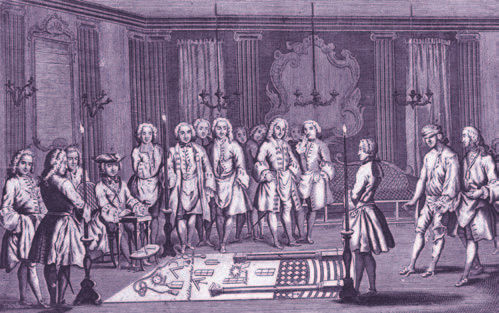Voltaire Is Formally Received as a Member of the Masonic Lodge in Paris: August 7, 1778
- Catholic Textbook Project

- Aug 4, 2025
- 3 min read
This text comes from our book, Light to the Nations, Part II.
One of the most mysterious groups in European history is a secret society that takes its name from a medieval guild of craftsmen. It was named the Freemasons because the group actually arose from the medieval craft guild of masons (stonecutters). But how it developed from an association of craftsmen to a kind of club for freethinkers, philosophes, and Enlightenment statesmen makes for an interesting tale.
The Freemasons themselves told a fanciful story of their origins. They said their organization went back to workmen who built Solomon’s Temple in the centuries before Christ. In reality, the Freemasons originated from a guild of journeymen builders of the Middle Ages. These medieval guildsmen formed themselves into smaller groupings, called lodges, and, like other medieval guilds, swore that they would be “faithful to God and the Church.”

In England, the Freemasons became important when their members were enlisted to rebuild London after a great fire destroyed much of the city in 1666. In the latter part of the 17th century, they opposed the Stuart kings and began to attract members from the English nobility and the wealthy merchant class. By the beginning of the 18th century, Freemason lodges were no longer gatherings for workingmen but centers for introducing men to “philosophy.” In 1721, a former Presbyterian drew up a rule that organized all the lodges under a Grand Lodge, controlled by members of the nobility. The symbols of the medieval guild (the set square, a trowel, and a workman’s apron) were given mystical meanings, and members practiced mysterious rites that they swore to protect with absolute secrecy.
Freemasonry eventually split into English and Scottish rites, and lodges spread from the British Isles to cities in the Netherlands, Spain, Italy, and Germany. In 1732, an English-rite lodge, called Au Louis d’Argent, was founded in Paris. The Scottish-rite St. Thomas lodge soon followed. It was the Scotsman Michael Ramsey who reorganized the French Freemasons into an independent lodge, controlled by what was called the Venerable Assembly “Grand Orient.” The first grand master of French Freemasonry was Louis XVI’s cousin, the duke of Chartres, Louis-Philippe d’Orléans.

But whether Scottish, English, or French, Freemasonry attracted members of the nobility as well as philosophes. Yet despite its Enlightenment leanings, Freemasonry was not at first clearly anti-Christian or anti-Catholic. Indeed, many Freemasons were Catholic priests and even bishops. The Cistercian monks of Clairvaux had a Masonic lodge within their monastery. One can find statements by 18th-century Freemasons showing devotion to the Mass, Our Lady, and the saints. Except for a kind of Freemasonry in Germany, called “Illuminism,” Freemasonry hardly seemed anti-Catholic at all in the 18th century.
The Jesuits were the first religious order to forbid their members to be Freemasons. Bishops began to follow suit, and some forbade prominent Freemasons to be buried in consecrated ground. Finally, in 1738, Pope Clement XII condemned Freemasonry and forbade Catholics to have anything to do with Masonic lodges. Pope Benedict XIV repeated this condemnation in 1751.
Why did the popes condemn Freemasonry? In part, they did so because its members were required to take oaths of secrecy. More important, said the popes, Freemasonry encouraged Deism and so undermined the Catholic Faith both in individual souls and in society at large. For the Freemasons, God is the Deist “Great Architect” of the universe, not the Holy Trinity who cares for all things with his loving providence.
The anti-Catholic character of Freemasonry is evident because it attracted prominent philosophes, including Voltaire himself. On August 7, 1778, Voltaire was formally received as a member of the Paris lodge. Entering the lodge arm in arm with Voltaire that day was an American scientist and statesman who had won the hearts of the Paris aristocracy by his learning and wit. This statesman’s name was Benjamin Franklin.


